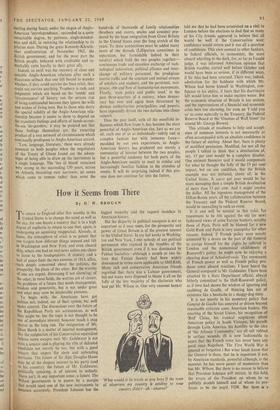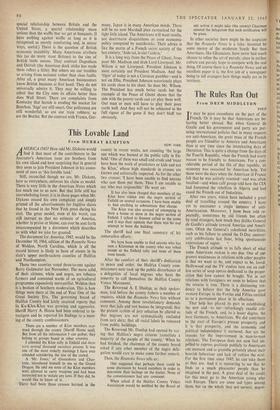How it Seems from There
By D: W. BROGAN
To return to England after five months in the United States is to change the mind as well as the sky, for one leaves a country that is in a high degree of euphoria to return to one that, again, is undergoing an agonising reappraisal. Already, at home, the atmosphere of crisis is so potent that one forgets how different things seemed and felt M Washington and New York and even aboard ship, where one had no real news unless one chose to listen to the loudspeakers. A century and a half of peace finds the two enemies of 1814, allies,
• each deeply concerned about the policies, the Prosperity, the plans of the other. But the worries of one are urgent, distressing if not alarming; of the other, in most fields, the worries are of choice, the problems of a future that needs management, wisdom and generosity, but is not under great and what may soon be intolerable pressure.
To begin with, the Americans have got Politics not, indeed, out of their system, but well under control. The discussions over the future of the Republican Party are acrimonious, as well they might be, but the topic is not thought to be one of immediate interest, however much it may matter in the long run. The resignation of Mr. bean Burch is a matter of internal management, hke the resignation of his Conservative equivalent (whose name escapes me). Mr. Goldwater is not even a senator and is playing the role of defeated candidate not merely by ear, but with a good temper that angers the stern and unbending Partisans. The future of Sir Alec Douglas-Home may be of the deepest interest to his party (and to his country); the future of Mr. Goldwater, Politically speaking, is of interest to nobody. There isn't, in any important sense, a future. The Wilson government is in power by a margin that would need one of the new instruments to measure accurately. President Johnson has the biggest majority and the vaguest mandate in American history.
But the disparity in political resources is not as important as it may seem, for the prosperity and power of Great Britain is of the greatest interest to the United States. In my last weeks in Washing- ton and New York, I met nobody of any political persuasion who rejoiced in the troubles of the British government even if it was dominated by Fabian Socialists—although a month or two be- fore that Fabian Society had been widely denounced in terms more applicable to SMERSH. Many rich and conservative American friends regretted that, there was a Labour government, but not many were disposed to blame it all on the folly of the tiny majority of the electorate who had put Mr. Wilson in. One very eminent banker 'What would it be worth to you boys if the team of observers my country is sending to your country didn't—ah--observe?' told me that he had been astonished on a visit to London before the elections to find that so many of his City friends appeared to believe that all would be well if the Conservatives won; confidence would return and it was all a question of confidetice. This view seemed to other bankers, to federal officials, to economists, the most absurd whistling in the dark, for, as far as I could judge, it was informed American opinion that British troubles started well before October and would have been as serious, if in different ways, if Sir Alec had been returned. There was, indeed, admiration for the boldness with which Mr. Wilson had borne himself in Washington, con- fidence in his ability, if fears that his doctrinaire left would force him to make matters worse. But the economic situation of Britain is too serious, and the repercussions of a financial and economic crisis here too alarming, for even an 'I told you so' to come naturally to the Treasury, the Federal Reserve Board or the 'Gnomes of Wall Street' (to amend Mr. George Brown).
This attitude of readiness to help and accept ance of common interests is not necessarily or often accompanied with an absolute confidence in the future of sterling. About that, there is plenty of modified pessimism. Modified, for not all the people I talked to think that a devaluation of, say, 15 per cent would be a. complete disaster.' One eminent financier said it would compensate for what he thought the folly of the 15 per cent impost, but on one condition, that the British example was not imitated, above all, in the United States. A sauve qui peut would be far more damaging than a simple British devaluation of more than 15 per cent. And it might involve the dollar. All the ingenious management of the Dillon-Roosa years, all the collaboration between the Treasury and the Federal Reserve Board, would be unavailing in such an event.
It is and will be natural in this crisis for resentment to be felt against the old (or new) fashioned views of some Europe bankers, notably those of Paris. Paris will be blamed for a new Gold Rush and Paris is very unpopular for other reasons. Indeed, if French policy were merely animated by a desire on the part of the General to avenge himself for the slights he suffered in London and the nonsensical childishneSs of Roosevelt's policy, he might now be enjoying. a cheering dose of Schadenfreude. The resentment of French power as well as French policy pro- duces some absurd reactions. I have heard the General compared to Mr. Goldwater. I have been attacked by a State Department official, always bitterly committed to the Hull-Roosevelt policy, as if time had shown the wisdom of ignoring and snubbing de Gaulle, of thinking him out of existence like a headache in a shaggy-dog story.
It is not merely in his monetary policy that General de Gaulle has annoyed or driven beyond reasonable criticism some American leaders. His courting of the Soviet Union; his recognition of 'Red' China, his ironical scepticism about American policy in South Vietnam, his parade through Latin America, his hostility to the idea of 'the Atlantic Community,' are all salt rubbed in surface wounds. (It is now fashionable to assert that the French army has never been any good since Napoleon. The First World War is ignored or forgotten.) But wiser heads know that the General is there, that he is important if not, by American standards, powerful although, at the moment, he has more power of manoeuvre than has Mr. Wilson. But there is no reason to believe that President Johnson will imitate, in this field, the errors of the President on whom he so publicly models himself and of whom he pro- fesses to be the pupil, FDR. But there is a special relationship between Britain and the United States, a special relationship more serious than the waffle that we get at banquets. (1 have nothing against waffle as long as it is recognised as merely comforting and, in minor ways, useful.) There is the question of British economic instability. Many Americans attribute this (as do many stout Britons) to the sins of British trade unions. They contrast Dagenham and Detroit (the American dock strike has made them reflect a little). But others see our troubles as arising from national rather than class faults. After all, a great many American businessmen know.British business at first hand. They do not universally admire it. They may be willing to admit that the City runs its affairs better than does Wall Street. There are complaints from Kentucky that Scotch is eroding the market for Bourbon. 'Jags' are still smart. Our policemen are still wonderful; so are our train robbers; so are the Beatles. But the contrast with France, Ger- many, Japan is in many American minds. There will be no new Marshall plan earmarked for the tight little island. The Americans will want results, not doctrinaire disquisitions or even economic policy computed by matchsticks. Their advice is like the motto of a French secret society of the last century, 'Aide-toi, le ciel t'aidera.'
It is a long way from the Peace of Ghent, from poor Mr. Madison and drab Lord Liverpool. Mr. Wilson is not Liverpool; President Johnson is most certainly not President Madison. And the 'Ogre' of today is not a Corsican gambler—and is not on Elba. President Johnson notoriously plays his cards close to his chest. So does Mr. Wilson. The President has much better cards but the example of the Peace of Ghent shows that the side with the poorer cards can yet play them well. Our man or men will have to play their poor cards well. And they will not be subjected to the full rigour of the game if they don't bluff too obviously.







































 Previous page
Previous page